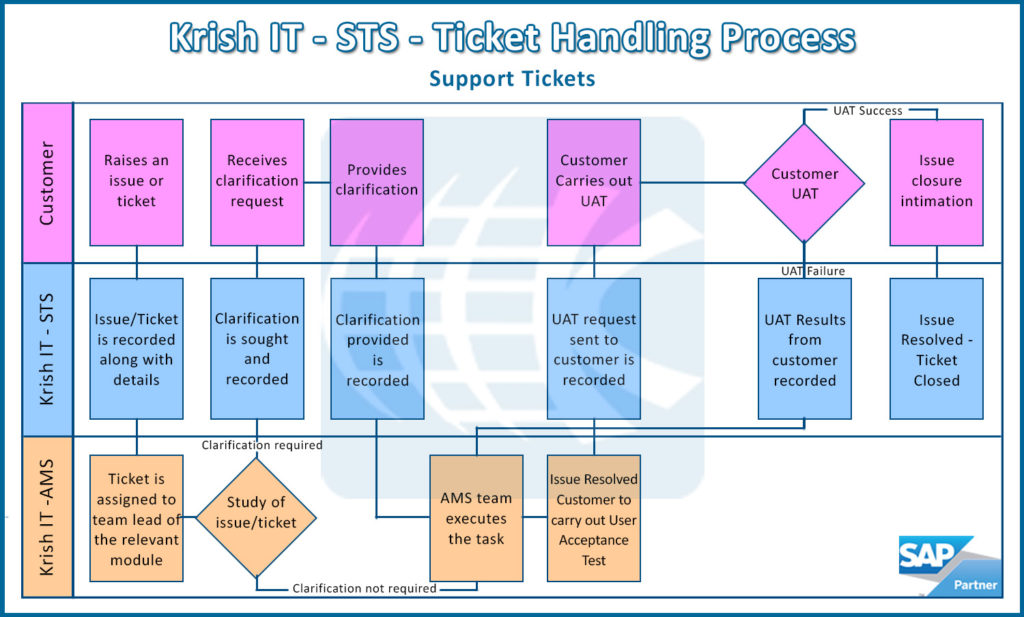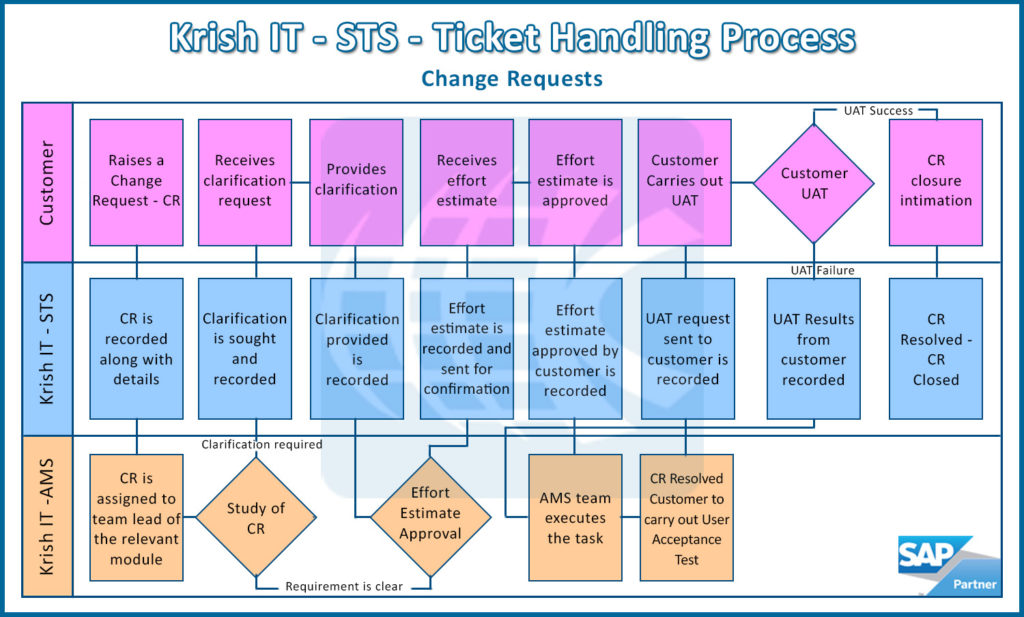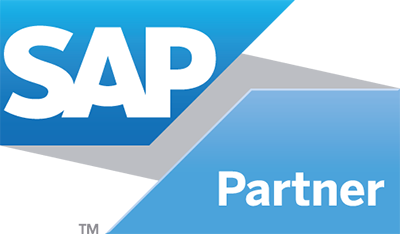Annual Maintenance Support
Annual Maintenance Support is called as Krish “X” Care services in Krish IT terms. All you need to keep your SAP systems run at their best performance. Krish IT propose to deliver the requisite IT Services using our innovative and optimal HYBRID (On Site, Near Shore/Off Site and Off Shore) Delivery model that will deliver the scoped IT services for clients at lower cost. The central theme of our service delivery model is an Integrated Centralized service help desk.
This service desk will become the single point of contact for issues. Krish IT use ITIL and Agile compliant ticketing tool for this service desk. The end users of can log a problem or raise a query through the web, email, visit or phone. All issues will be addressed within the SLAs which would be agreed up on the due diligence phase of the project along with clear service catalog, categories and priority.
Call handling Methodology

Tools Deployment
It has its own ticketing tool namely STS (Support Ticketing System) for its AMS customers to record their requirements and issues. STS has been developed in JAVA platform and it is in use for the past 7 years. It is readily available in the URL ‘support..in’. Each and every company has its own space in STS and is accessible through dedicated user-ids created by for relevant company users.
Some of the salient features of STS are described below:
- STS site is available 24/7, Companies can create the tickets covering their requirements
- Whilst raising a ticket there is a provision to enter a brief description of the issue or change request and once posted in STS it alerts AMS head and CAMs for to respond
- STS tracks all the detailed information and communications and provides for facilities to attach screen shots, files in word, excel, pdf formats
- All communication can happen through STS. Whenever we create or edit with the information we would like to convey, the same will be triggered as mail while saving the ticket. No separate mailings required
- Complete conversation and solution provided will be available in the ticket. This will help us to see the same even in a later stage if required
- Users can easily track their tickets by simply by logging into STS and by reviewing the Status & work log attached to ticket. Different statuses are available like 'Assigned to Consultant', 'In Process', 'User Test', 'Customer Action', 'Hold', Solved' etc.,
- Consultants will update their effort in terms of hours in STS as and when they complete their day's work. This will help users to know about the progress
- All the transport requests pertaining to one ticket can be stored in STS in dedicated tab provided for that purpose
- Documents related to the tickets like scope document, customizing document, functional specification, technical specification, TR history form can be stored in STS to help everyone to access at any point of time
- Reports are available to check the statuses of all the tickets along with other information and effort recorded by the consultants for any given period of time
- For Change Requests we follow a similar process of handling the ticket but additionally would evaluate the requirement to see whether standard functionalities could be invoked to satisfy Bull Machine's change request. would estimate the time & effort required to accomplish the change request and submit the same to Bull Machine for approval. Upon receipt of approval from Bull Machine the CR would be taken up for completion
Governance Model
1. Program Management
Program management and governance for this engagement will be delivered through the Program Management Office (PMO). The role may also be referred to as a CAM (Customer Account Manager). The program manager will be assigned to and will be supported by PMO organization to verify that the management practices and methodologies that are implemented at are consistent with best practices.
The CAM will provide the management and appropriate support to enable to:
- Provide with a single point of contact and support for deliverables for this engagement
- Be the principal point of contact to management and be responsible for managing the steady state delivery, escalation, measurement, and evolution of Services provided under the SOW • Conduct performance management reviews
- Plan and manage approved projects, program staffing, and other resources required for the support of Bull Machines
- Manage and update the operational guide if applicable
- Manage resources and support groups to meet agreed upon Service Levels
- Manage and act as the focal point for joint communications between and Bull Machines
- Review and approve schedules, plans, and any requested changes or modifications
- Facilitate, lead, and represent during meetings, program reviews, issue resolution discussions, escalations, scope change processes, approvals, and acceptance
- Provide regularly scheduled reports and status reports as specified in the SOW
- Provide escalation management
2. Communications
The communications plan will summarize scheduled communication activities for all program team members. and will mutually agree to the meetings and a detailed communication plan will be developed and documented. The communications plan identifies specific scheduled conference calls, meetings, and calendar of activities.
3. Status Review Meetings
Status Review Meetings will be held to address support project issues. and representatives will be required to attend these meetings. The meeting agenda will include:
- Review of support status
- Report on support metrics
- Review status of operations
- Review of outstanding change management and issue resolution items
- Creation of action item list, assignments, and status
- Review of communication plans
4. Reporting
The team shall provide with written status reports as mutually agreed. Specific status reports will be provided to accordingly. Where feasible, the reports will be provided electronically. The format shall be mutually agreed upon before the start of the support.
5. Program Escalation
It will implement an escalation plan in order to facilitate the escalation of incidents or issues to the appropriate level of and/or management for resolution. This plan is specific to the scope of Services that are provided by and addresses the escalation and communication path for and Bull Machines, its management, and the support team. is responsible for identifying their initial escalation contacts.
The escalation matrix is to be completed jointly between and to assist with identifying resources for specific functions based upon escalation type, timeframe, and Service Level escalation requirements. This document is a guide to be utilized by and Management to provide an additional communications path for issues related to performance, scope of Services or contractual issues.
Communication Plan
Communication and Coordination
It will develop a communications plan to address the communication requirements of the engagement during Steady State services. The communications plan will document the information, the format, the distribution list/attendees, and frequency. and will jointly develop and mutually agree to the communication schedule. The final communication schedule will be identified during the implementation process. The meeting schedules will include as a minimum the following:
Meeting Schedule
-
Meeting Description :
Status Meeting -
Frequency :
Bi Monthly -
Purpose :
Review of current open issues, and upcoming events
-
Meeting Description :
Performance Review -
Frequency :
Monthly -
Purpose :
Review of current open issues and upcoming significant events along with SLA performance
-
Meeting Description :
Steering Committee -
Frequency :
Quarterly -
Purpose :
Review of SLA performance such as trend analysis, review of current open issues, opportunity for senior management from and to provide long term, vision, direction, and strategy
-
Meeting Description :
Technology and Service Trends -
Frequency :
Semi - Annually -
Purpose :
A meeting to discuss new service products and technologies with to inform and educate
SLA Measurement & Governance
Support structure and SLA
- Support engineers will operate in the aBOT# timeframe defined below. Only showstoppers will be attended during non-aBOT. For non-aBOT hours contact details are provided below. Any change in the contact details shall be communicated to in writing by the
- All the issues / tickets should be logged into our support ticketing system “support..in” only by the super user(s) from the client side, without which action will not be taken. Exceptions are Very High severity tickets and non-availability of support portal.
- Training of the support portal will be provided to the required super users
- Support center contact
- Phone Number
- Email ID
- After creating a ticket in the support portal, all Very High and High severity tickets and showstoppers should be reported by phone call to the support center within 15 min of creation
- Any ticket, which is in "hold", "solved" or "customer action" status for more than 5 working days, will be closed. If required, can be reopened as a new ticket
- Any new requirements should be clearly classified as CR and should not be created as a support ticket in the portal. SLA will not be applicable for CR; Delivery date will be mutually agreed and tracked
- Holiday calendar will be followed by the support team and will be shared with the client at the beginning of each calendar year or AMS contract. will ensure the availability of team during weekends/month ends for any critical support
-
Consulting team deployed for offshore support will be minimum of level L2. Trainings will be handled by SMEs
# Attended Business Operating Time (aBOT)
- Monday to Friday from IST 10:00 AM to IST 6:00 PM
- Excluding the hours in "Customer Action", "User Testing", "Hold" and "Solved" status or other status for which customer is responsible for
Severity Definition
- Very High : A ticket should be categorized with the severity "Very High" if the problem has very serious consequences for normal business processes. This is caused by the following circumstances:
- A productive system is completely down
- The customer's core business processes are seriously affected
- Workaround is not available for the problem
- High : A ticket should be categorized with the severity "High" if normal business processes are seriously affected. Necessary tasks can be performed only with a workaround. This is caused by incorrect functions in the SAP system that is required immediately. The ticket is to be processed quickly as the malfunction can seriously disrupt the business processes
- Medium : A ticket should be categorized with the severity "Medium" if the problem has a non-critical effect on normal business processes. The problem is caused by incorrect or inoperable functions in the SAP system that is required periodically
- Low : A ticket should be categorized with the severity "low" if the problem has little or no effect on normal business processes. The problem is caused by incorrect or inoperable functions in the SAP system that are not required daily or are rarely used
Service Level Dependencies
The above SLAs are being suggested based on certain factors; following are the dependencies and assumptions:
Failures due to environmental or power non-availability will not be included in downtime calculations attributed to
- Calculations for SLAs shall not include planned downtime
- It will be responsible for providing high availability and redundancy across entire systems, network, database and application software at DC / DR to ensure committed SLA can be delivered
- The Hardware Services vendor would have committed Service Levels for break-fix resolution. The responsibility of ensuring that the vendor provides the Service Levels will be that of Bull Machines
- Calculations for overall resolution time shall not include the duration for which the infrastructure was down due to the Hardware Services Vendor delay in providing service
- Force Majeure clauses such as Fire, Earthquake, Floods, Govt. problems, riots and civil disturbance, service provider strikes, acts of God shall not be included for SLA calculation. SLA calculation will exclude any downtime caused by unauthorized access / changes to the network without prior permission or authorization from 's specific service delivery team. responsibility is limited to instructing the Vendor for network failure & SLA are not applicable
- Any act or omissions attributable to or persons authorized by it which adversely affects Service Levels committed by (For e.g.: time lost in the event of inadvertent user, initiated changes or modifications etc.). Downtime will not be considered for any outage beyond span of control. Time required for testing of patches, installation of OS and transfer of data is not included in SLA calculation
Change Request Management

Value Added Services through Custom Application Development and Integration with SAP
It has extensive experience in building applications that integrate well with SAP systems. This involves developing web and mobile applications that integrate with SAP through a middleware service. The applications are developed using some of the industry standard open source language, frameworks and tools.
has developed several applications, which has helped companies improve efficiency in various functional areas like production, logistics, field staff management, sales and marketing etc. Additionally, it has helped companies achieve improved transparency and trust among their customers, vendors and suppliers.
Solutions
- Customer portal for performing KYC, viewing their invoices and outstanding
- Vendors and Suppliers can track their purchase orders, invoices and payments
- Reporting and Dashboards using SAP integrated middleware services
- Primary sales solution integrated with ERP
- Digital signature solution integrated with SAP
- Many mobile apps that perform specific functions in the production process
- Mobile apps for tracking field force attendance and expense management integrated with SAP
- Payment services integration
- CRM integration
Development and Services capabilities
- Enterprise integration to provide end-to-end process integration including SAP, products and custom-built solutions
- Third party API integration with SAP through middleware services
- Web applications
- Mobility solutions
- Chatbots
- Notification Services using SMS, Email and Push services
- Automation using Machine Learning
- DevOps services
Technologies
It has extensive experience in building applications using various open source technologies. Some of the key technologies are mentioned here
Languages and Platforms
- Java
- Net(C#)
- Python
- Spring stack
- MEAN stack (MongoDB, Express, Angular and NodeJS)
- MERN stack (MongoDB, Express, React and NodeJS)
Databases
- Oracle
- MySQL
- SQL Server
- MariaDB
- Arora on AWS
Mobile Technologies
- Android (Java, Kotlin)
- iOS (Objective-C, Swift)
- Cross platform mobile app using IONIC framework
Databases
- AWS - Amazon Web Services
- Azure
OS Platforms
- Linux (RedHat, Ubuntu, CentOS, Amazon Linux)
- Windows


